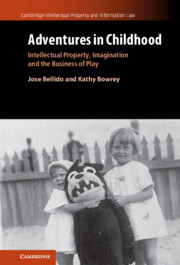Book contents
- Adventures in Childhood
- Cambridge Intellectual Property and Information Law
- Adventures in Childhood
- Copyright page
- Contents
- Figures
- Acknowledgements
- Abbreviations
- Introduction
- 1 Commercialisation and the Innocent Child
- 2 Books, Toy Books and the Artfulness of Consumption
- 3 Instructions for a Successful Boy
- 4 Animated Properties
- 5 Licensing Gone Wrong
- 6 The Rise of Merchandising Agencies
- 7 Troubles at the British Broadcasting Corporation
- Conclusion: Unsuitable for Children
- Index
- Cambridge Intellectual Property and Information Law
6 - The Rise of Merchandising Agencies
Published online by Cambridge University Press: 30 June 2022
- Adventures in Childhood
- Cambridge Intellectual Property and Information Law
- Adventures in Childhood
- Copyright page
- Contents
- Figures
- Acknowledgements
- Abbreviations
- Introduction
- 1 Commercialisation and the Innocent Child
- 2 Books, Toy Books and the Artfulness of Consumption
- 3 Instructions for a Successful Boy
- 4 Animated Properties
- 5 Licensing Gone Wrong
- 6 The Rise of Merchandising Agencies
- 7 Troubles at the British Broadcasting Corporation
- Conclusion: Unsuitable for Children
- Index
- Cambridge Intellectual Property and Information Law
Summary
Chapter 6 traces the rise of merchandising agencies as a distinct and independent profession in the United Kingdom. It focuses on the most influential independent agency of the period, Walter Tuckwell & Associates. A former Disney employee, Tuckwell fostered a network connecting and linking commercial and legal opportunities offered by television programmes and the emerging demand for child-related products. The chapter discusses the specific relationship between content creation and marketing that arose during the earliest days of television. This entails a discussion of Tuckwell’s role at the British Broadcasting Corporation (BBC), where objections to the development of merchandising inside the corporation were managed. Commercial television changed agendas, leading to stabilisation in contractual practices between broadcasters, licensing agencies and sectors such as the toy, publishing and food industries; all eager to capitalise on the new communication medium. By the late 1960s, children’s participation in commodification was a fully integrated component of intellectual property practice and an integral part of television culture, regardless of the character of the broadcast licence.
Keywords
- Type
- Chapter
- Information
- Adventures in ChildhoodIntellectual Property, Imagination and the Business of Play, pp. 189 - 236Publisher: Cambridge University PressPrint publication year: 2022



